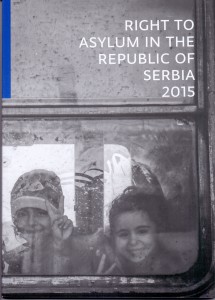Yesterday the ICTY Trial Chamber convicted Radovan Karadzic, the wartime political leader of the Bosnian Serbs, for numerous crimes committed during the conflict and sentenced him to 40 years imprisonment. The (mammoth) trial judgment is here, standing at 2615 pages that not even Karadzic’s lawyers will read as a whole; the more accessible summary is here.
Serbia from transit to destination country – Refugee integration challenges and practices of selected states
The Belgrade Centre for Human Rights, in cooperation with the Embassy of the Netherlands in Belgrade and the VluchtelingenWerk Nederland in Amsterdam, prepared and published a publication titled Serbia from transit to destination country – Refugee integration challenges and parties of selected states, that deals with refugee integration in Serbia and the region. It contains recommendations for further development and harmonization with European standards in this field. Beside countries from the region (Slovenia and Macedonia) which are facing similar challenges, the publication presents the example of the Kingdom of the Netherlands, due to its impressive refugee integration system that we have a lot to learn from in the process of developing these policies. (more…)










